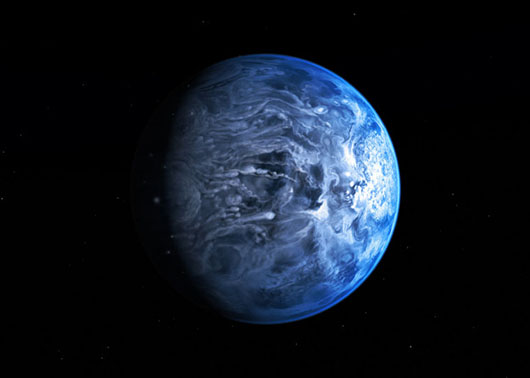Seeding life in the clouds of alien worlds

Clouds in the atmospheres of alien worlds could give rise to the precursors to life, researchers at the University of St Andrews have revealed.
Dr Craig Stark and colleagues in the School of Physics and Astronomy have studied the atmospheres of alien worlds called exoplanets – those which orbit other stars that are not our Sun; and failed stars (called brown dwarfs – those not big enough to burn properly like the Sun).
Their research, to be published in the International Journal of Astrobiology, found that such electrified dusty environments can lead to the formation of prebiotic molecules – the biological seeds that produce life.
Dr Stark said: “The atmospheres around exoplanets and brown dwarfs form exotic clouds that, instead of being composed of water droplets, are made of dust particles made of minerals.”
The European Research Council (ERC) funded Life Electricity Atmosphere Planets (LEAP) group – led by the University’s Dr Christiane Helling – has shown that, just like on Earth, these clouds can become charged and lightning can occur, electrifying the atmosphere which can create special gases that contain charged particles (electrons and ions) in these atmospheres.
Dr Stark added: “These charged gases are called plasmas – like those found in fluorescent lights and plasma televisions. The dust can find itself immersed in the charged gases and the charged particles stick to the dust making the dust charged. The charged dust attracts onto its surface other charges from the surrounding plasma helping grow molecules on the dust surface.”
Together with his colleagues Dr Paul Rimmer, Dr Declan Diver and Dr Helling, Dr Stark demonstrates that it is these environments which could see the formation of prebiotic molecules. Dr Stark will present this work at the Discussion Meeting of the Royal Astronomical Society today. (Friday 10 January) in London.
Note to Editors
For image or to interview Dr Stark please contact the press office on 01334 462530.
The paper is available online.
Issued by the Press Office, University of St Andrews
Contact Victoria Herd on 01334 462530.
Ref: (space dust 10/01/14)
View the University’s latest news at www.st-andrews.ac.uk/news
Category Research